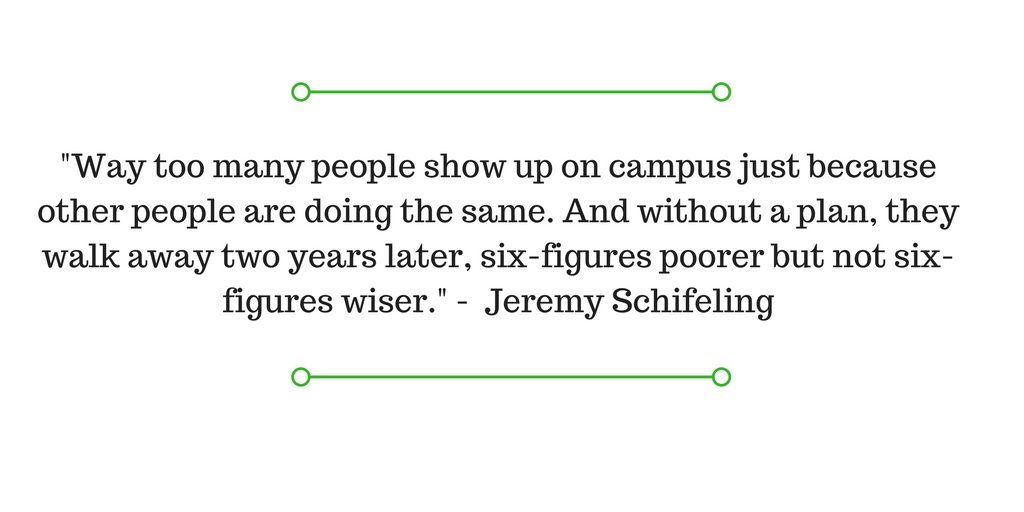How to Begin Your MBA Search, Part I

You’ve weighed your options, and it seems like getting an MBA might be the best route to attaining your professional and personal goals. You’ve considered the expense and the time spent away from the workforce that an MBA requires, and you’re finally ready to begin your MBA search.
You’ve even read Philip Delves Broughton’s advice against attending business school in The Economist, and still find yourself cracking GMAT Study Guides and searching ROI figures in U.S. News & World Report. But even if you’re the most motivated future MBA, it is of utmost importance to ask yourself a number of questions as you embark on the process of applying and gaining admission to business school.
“Understand Where You Want to End Up Before You Even Begin”
Those are the wise words of Jeremy Schifeling, the founder of Break Into Tech and a veritable guru on the subject of how to find meaningful work in the tech world without engineering experience. A graduate of the University of Michigan’s Ross School of Business, Schifeling also speaks to his experiences there, adding that “way too many people show up on campus just because other people are doing the same. And without a plan, they walk away two years later, six-figures poorer but not six-figures wiser.”
The end lesson from Jeremy’s advice? Suss out what you want to do with an MBA, and don’t just go into a b-school program to make a lot money, or because everyone else seems to be doing so. Make a plan, and even if that plan changes, you’ll still have a leg up on many of your classmates.

Figure Out What Programs Best Fit Your Plan
Let’s imagine that you know that you are interested in supply chain management. You could search around the web for schools that have special programs in logistics and supply chains, but that will only take you so far. Consultant Stacy Blackman notes, “some of our clients call up companies they are interested in working with to learn their opinions of target schools and where they recruit. If you are very specific about where you want to end up, this is a great idea.” Thus, if you’re certain about a career in operations and logistics, it might behoove you to contact companies like XPO Logistics or Werner Enterprises to see what b-school programs their management team recruits from.
If you’re not certain of exactly what career you want an MBA to lead to, but you have a general idea of the business field that you’d like to pursue, then it might be more reasonable to think about where you want to end up.
Location, Location, Location
Paul Bodine of Paul Bodine Consulting/Admitify says that it is absolutely necessary to ask yourself, “what geographies are essential to your post-MBA career and/or life goals?” The question can make all the difference in what schools you consider applying to—Bodine notes that “you can spare yourself the challenge of seeking admission to the top 10 schools if you have a defined region where you want to make your stand professionally and personally.” If you are wedded to working in traditional commodities markets (and bitcoin, surprisingly), then it wouldn’t make sense to stray far from the Chicago Mercantile Exchange, for example. If your search is geographically limited for reasons beyond your control, then find out which programs suit your needs best within that area. A tech business mind in the South might ponder schools in Knoxville or Atlanta, whereas a future lumber baron in the Pacific Northwest need look no further than Oregon State in Corvallis. There are opportunities everywhere, but it is up to you to find those that are most in line with your goals!
Stay tuned for part two of our series, coming soon!
What Should You Study? Finance vs. Marketing MBAs

George Harrison, in his final album Brainwashed, has a line in a song that goes, “We pay the price with a spin of a wheel / with a roll of a dice / Ah yeah, you pay your fare and if you don’t know where you’re going / any road will take you there.”
To Be Out—or Not to Be Out—in Your MBA Application?

In honor of yesterday’s National Coming Out Day, we thought we’d tackle a thorny question faced by some applicants to leading business schools: To be out—or not to be out—in your MBA application? In recent years, increasing numbers of top business schools have given applicants the opportunity to disclose their sexual orientation as lesbian, gay, bisexual, transgender, or queer (LGBTQ) as part of their application if they so choose. But what are the pros and cons of doing so? To find out, we spoke with admissions directors at schools all over the country to get their input.
The overwhelming consensus, we found, was that there are multiple positives and few, if any, negatives to sharing your sexual orientation as part of the application process provided you feel comfortable doing so. This is not to say that anyone should feel pressured to disclose anything that they are not personally comfortable sharing—just that those who feel inclined to share shouldn’t have any hesitation from an admissions standpoint.
“I Really Only See Pros”
“I really only see pros,” says Soojin Kwon, managing director of full-time MBA admissions at the University of Michigan’s Ross School of Business. “We are always encouraging applicants to be very authentic and bring their whole selves so that we have context around them. We are a very diverse and inclusive community, and we want to know every aspect of who you are and what you’ll bring to that community.”
Applicants who do disclose LGBTQ status—or even those who don’t—also can indicate that they would be interested in hearing from students in the school’s Out for Business student club, which helps prospective students get tapped into the campus LGBTQ community well before they arrive on campus. “Our current LGBTQ students absolutely reach out, embrace, and actively engage with applicants who self-identify because they want to make sure that our community is very strong on every aspect of diversity—they are very proactive,” Kwon says.
NYU Stern School of Business Associate Dean of MBA Admissions Isser Gallogly stresses that whether or not to disclose sexual orientation is a personal choice that should be based on each individual’s comfort level. “But certainly at NYU Stern—in New York’s Greenwich Village—we are obviously incredibly diverse and supportive of diversity,” he says. The LGBTQ rights movement can trace its origins to the neighborhood surrounding Stern, and a community of acceptance has prevailed there for decades.
“It Might Present Certain Advantages”
But even beyond Greenwich Village and Stern, Gallogly tells LGBTQ applicants that they shouldn’t have concerns about being out in the MBA admissions process. “Business schools are looking for diversity—we as admissions officers are always looking for different vantage points and perspectives that applicants can bring to the class. I think anything that’s a little different or unique only helps your personal story,” he says. “I don’t think there’s any disadvantage to being out in the admissions process, and, in fact, it might present certain advantages.”
Self-Identifying Is First Step to Qualifying for LGBTQ MBA Fellowship
Indeed, students who self-identify as LGBTQ at certain schools will automatically be considered for scholarship aid through the Reaching Out LGBTQ MBA (ROMBA) Fellowship Program. ROMBA is a nonprofit organization dedicated to “educating, inspiring, and connecting the student and alumni LGBTQ MBA and graduate communities in an ongoing effort to create the next generation of out business leaders.” Recipients of the LGBTQ MBA Fellowship each receive a minimum of $10,000 in scholarship aid per academic year or $20,000 in total scholarship aid for two years. In addition, they get access to exclusive mentorship and leadership programming through ROMBA. Fifty-five members of the Class of 2019 will collectively receive more than $1,300,000 for each year in business school, ROMBA reports. “Since 2015, 35 schools have awarded $6.3 million to LGBTQ applicants who were out on their applications,” adds Matt Kidd, ROMBA Executive Director.
Beyond self-identifying through a school’s application form, applicants interested in being considered for the ROMBA fellowship are encouraged to demonstrate LGBTQ leadership roles on their resume, express interest in business schools’ on-campus LGBTQ clubs, and share relevant LGBTQ leadership experiences in their application essays.
YOU MIGHT ALSO LIKE: This Year’s Reaching Out MBA LGBTQ Conference Arrives in Boston
Prem Tumkosit, a 2011 MBA graduate from Yale School of Management (SOM), didn’t explicitly disclose his sexual orientation on his MBA applications. When he was applying, that option was provided by fewer schools. “But I did list my participation and leadership positions in LGBT organizations, which I felt was essentially disclosing,” he says.
Gallogly adds that current students are frequently shocked and surprised—once they begin the recruiting process—by how many corporations are likewise looking for diversity, including in sexual orientation. “The short story is if you feel comfortable, I would go for it [disclose sexual orientation], because you will see opportunities to receive support,” he said. “Short story: It’s a good thing.”
Opt in to Get Connected to On-Campus Groups
Bruce Delmonico, Assistant Dean and Director of Admissions at Yale SOM, says that his team considers it so much a positive that he sometimes has to stop and remind himself that some applicants might actually wonder if it could be viewed as a negative. “We consider it an aspect of diversity, so we certainly don’t see any negative in it,” he says. As at Ross—and many other schools—Yale SOM also allows applicants to opt-in to receive communication from LGBTQ students and groups, which helps facilitate valuable connections both during the application process and in the months leading up to school’s start.
“I really don’t see any negatives to it,” Delmonico continues. “People sometimes choose not to disclose, and obviously that is fine—it’s everyone’s individual choice,” he notes. “It can still be a difficult thing—and people are at different stages in terms of their own self-identification—so it is not as though not sharing is viewed negatively. But it is an aspect of diversity that we think about as we are trying to put together our class, so we view it as a positive.”
Delmonico does share that Yale has seen an increase in the number of people self-identifying as LGBTQ. “I think that’s a good thing,” he says, “but we do want to make sure people are being accurate in self-reporting,” he adds. Especially outside of the United States, he worries that not everyone knows what it means to identify as LGBTQ.
Don’t Self-Identify as LGBTQ If You’re Not LGBTQ
“We also sometimes have to wonder if some candidates might be looking to game it a little bit,” he says. “That’s something we are starting to be sensitive to. We look at it as a positive—but we don’t want people just checking the box because they think it might give them a little boost over other applicants.” To offset potential gaming of this system, his team has begun to dig a little deeper to see what being LGBTQ means to those who check the box. “It’s not something we would ask about in an interview,” he stresses, “but we will look to see what else they might have shared” that might support their LGBTQ status. “It can be helpful, if you are self-reporting, if you share some way you are expressing that already,” he says. For example, some people write about LGBTQ themes in their essays or talk about related groups they’ve been part of, he says.
Amanda Carlson, Assistant Dean of Admissions at Columbia Business School, shares that her team also saw an uptick in self-reporting among applicants for the Class of 2019, particularly from certain regions. “I am saying this somewhat tongue and cheek,” she notes, “but it’s like some admissions consultant told candidates in China that saying you are part of the LGBTQ population is a good thing, because I think every single Chinese candidate this year checked the box.” Of course, she met personally with Chinese candidates who were quite genuinely members of the LGBTQ community, she adds, but she also wonders if there was some confusion among some applicants about what LGBTQ means.
“At the same time, we recognize that there is an appeal to being in New York—where people rightly feel that being LGBTQ is a warm and accepted thing—where it may not always be in China,” she notes.
Is LGBTQ Inclusive Enough?
Maryellen Reilly, deputy vice dean of admissions, financial aid, and career management at the University of Pennsylvania’s Wharton School, echoes what other admissions directors have said, adding that for some students it can also be liberating. “Some students may not have been out in high school or college and it can be liberating to share it as part of applying to business school—to get to say, ‘Here I am—this is who I am,’” she says. “It’s one less thing you have to worry about hiding at school.” As for a con to self-reporting, “I kind of don’t know that there is one—I can’t think of one,” she says.
Reilly remembers the process that her team went through when they first started thinking about adding the opportunity to self-identify as part of the application. “Did you know that Facebook has 50 different categories around sexual orientation?” she asks. She didn’t. “My mind was blown.” One of the students championing the cause argued that Wharton needed to include all 50. “It’s a spectrum—and we did a lot of learning from an admissions perspective,” she says. “Our LGBTQ community was really strong and vocal, and meeting them where they are required some give and take on both sides,” she says.
So far, her team hasn’t seen any candidates that it thinks might be trying to gain an unfair advantage by claiming to be LGBTQ when they aren’t. “We haven’t seen anything remotely like that—that’s a bridge we’ll cross when we get there, should we get there.”
Jennifer Redmond, a 2016 Wharton MBA graduate, did NOT disclose as part of her application that she is LGBTQ although the option was available when she applied. Prior to business school she worked in London in finance and hadn’t been open about the fact that she identified as a lesbian at work. “Being in Europe, I was reluctant to come out and potentially not have a great reception,” she says. That hesitation carried over to her MBA applications. “In retrospect, my advice to prospective applicants would be that you can tick that box,” she says. “It is completely confidential, and it’s a good way to get looped into all the activities that are available to members of the LGBTQ community.”
Redmond would later attend a welcome weekend at Wharton, where the Out4Biz student club hosted welcome drinks. “It was one of the biggest parties of the weekend, and it became clear to me that the LGBTQ community occupied a very central part of life at Wharton,” she says. “That ended up being a big part of my decision to attend.” When she did move over from Ireland to attend pre-term at Wharton, her roommate was gay and HAD ticked the box. “He was so much more looped into things than I was to start—it made me a little rueful I hadn’t ticked the box myself,” she says.
This article has been edited and republished from Clear Admit.
Rotman Appoints 5 New Faculty to Strengthen Research & Teaching

The Rotman School of Management at the University of Toronto has appointed five new faculty members for the coming year. These five professors will add to the research and teaching experience at the Rotman School for both pre and post-experience programs. The school also provided cross-appointments for four faculty members according to a news release.
How To Become An Accountant With An MBA

When it comes to stable career tracks, there are few more surefire bets than keeping the long arm of the Internal Revenue Service at bay, particularly if you’re the hyper-punctual, law-abiding, number-crunching type. If so, the role of accountant may be just right for you.
Business School to Break Into Tech?

Career changes are inevitable in this topsy-turvy economy, but how can business school graduates parlay their expertise into a lucrative and potentially high-impact career in the tech industry, which largely sources talent with more technical backgrounds?
